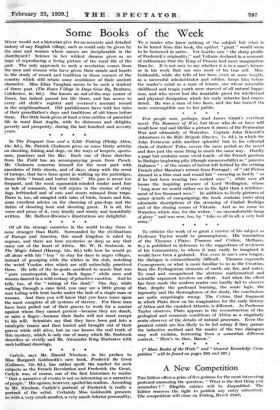To criticize the work of so great a master of
his subject as Professor Taylor would be presumptuous. His translation of the Timaeus ( Plato : Timaeus and Critias, Methuen, Os.) is published in deference to the suggestions of reviewers of his Commentary, to whom it may easily be imagined it would have been a godsend. For, even in one's own tongue, the dialogue is extraordinarily difficult. Timaeus expounds Cosmogenesis, or what is more familiar to us as the Creation, from the Pythagorean elements of earth, air, fire, and water. To read and comprehend the abstruse mathematical and scientific argument involves an effort. And when the effort has been made the modern reader can hardly fail to observe that, despite the profound learning, the acute logic, the ingenuity and the thoroughness of the study, the conclusions are quite surprisingly wrong. The Critics, that fragment in which Plato drew on his imagination for the early history of Attica and the vanished Atlantis, is different. As Professor Taylor observes, Plato appears in the reconstruction of the geological and economic conditions of Attica as a singularly acute observer of the details of natural processes. Even the greatest minds are less hkely to be led astray if they pursue the inductive method and _the reader of the two dialogues may well exclaim, borrowing from a somewhat different context, " Here's to thee, Bacon."
* 5 5 5


















































 Previous page
Previous page